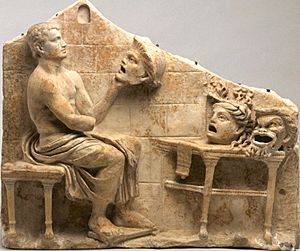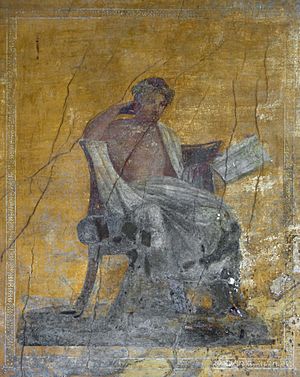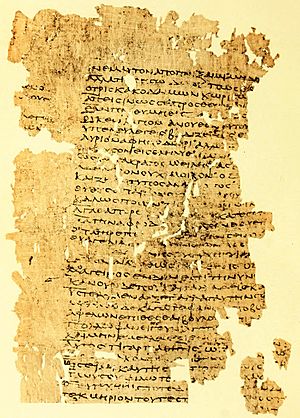Menander facts for kids
Quick facts for kids
Menander
|
|
|---|---|
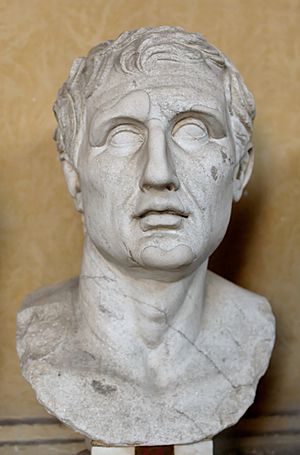
Bust of Menander. Marble, Roman copy of the Imperial era after a Greek original (ca. 343–291 BC).
|
|
| Born | 342/41 BC Kephisia, Athens |
| Died | c. 290 BC (aged 50 – 52) |
| Education | Student of Theophrastus at the Lyceum |
| Genre | New Comedy |
| Notable works |
|
Menander (born around 342 or 341 BC, died around 290 BC) was a famous Greek dramatist. A dramatist is someone who writes plays. He is known as the best writer of Athenian New Comedy. He wrote 108 comedies during his lifetime. He won first prize at the Lenaia festival eight times for his plays. We don't know how many times he won at the City Dionysia festival.
Menander was one of the most popular writers in ancient times. However, most of his plays were lost during the Middle Ages. Today, we only have small pieces of his work. Many of these pieces were found in the 20th century. Only one of his plays, Dyskolos, has survived almost completely.
Contents
Menander's Life and His Plays
Menander came from a wealthy family. His father, Diopeithes, might have been an Athenian general. Menander probably learned about writing comedies from his uncle, Alexis.
He was a friend and student of Theophrastus, a famous Greek thinker. Menander was also close with Demetrius of Phalerum, who ruled Athens for a time. He was even invited to the court of Ptolemy Soter, a king in Egypt. But Menander preferred to stay in his own home in Piraeus, near Athens.
Stories say that Menander drowned while bathing. His fellow Athenians honored him with a tomb on the road to Athens. Many statues believed to be of Menander still exist today.
Menander had a rival named Philemon. Philemon seemed to be more popular with audiences. But Menander thought he was the better writer. He once asked Philemon, "Don't you feel ashamed when you win against me?"
Some people accused Menander of copying other writers. However, changing and reusing ideas from other plays was common back then. So, this accusation is not as simple as it sounds.
It's not clear how long complete copies of Menander's plays survived. Some records suggest that 23 of his plays were still available in Constantinople in the 11th century. Famous writers like Plutarch and Quintilian praised Menander's work.
Menander admired and copied the style of Euripides, another great Greek playwright. Like Euripides, Menander was good at observing everyday life. He also understood human emotions well. He loved to use moral sayings in his plays. Many of these sayings became very famous. For example, "Whom the gods love die young" and "Bad company corrupts good manners." These short sayings were later collected. They were used as a moral textbook in schools.
Many Roman writers copied Menander's plays. For example, Terence and Plautus used Menander's stories as a base for their own comedies. Sometimes, they even combined parts of different Menander plays into one new play.
Why Menander's Plays Were Lost
Most of Menander's plays did not survive through the Middle Ages. We only have small pieces of them. There was a rumor that a library in Urbino had all of his works. But this has never been proven, and no traces of these complete works exist today.
Until the late 1800s, all we knew about Menander came from small quotes. These were pieces that other ancient writers had mentioned in their own works. There were about 1650 lines or parts of lines.
Discoveries in the 20th Century
This situation changed a lot in 1907. A collection of ancient writings, called the Cairo Codex, was found. It contained large parts of Menander's plays like Samia, Perikeiromene, and Epitrepontes. It also had a section of Heros and a piece from another play. In 1906, a fragment of 115 lines from Sikyonioi was found inside a mummy case made of papier mache.
In 1959, another important discovery was made. The Bodmer papyrus was published. It contained the complete play Dyskolos, more of Samia, and half of Aspis. In the late 1960s, more pieces of Sikyonioi were found. These were also used as filling for mummy cases. It turned out they were from the same ancient book as the 1906 discovery.
More papyrus fragments of Menander's plays continue to be found and published.
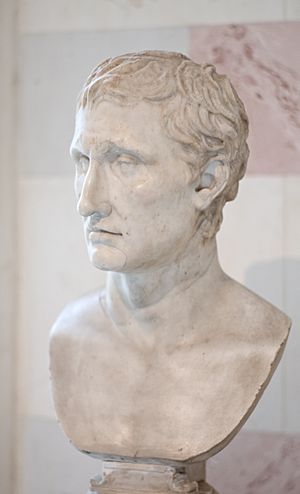
In 2003, a special manuscript called a palimpsest was found. It was written in Syriac in the 9th century. But the parchment it was written on was much older. It came from a valuable Greek manuscript of Menander's works from the 4th century. The surviving pages have parts of Dyskolos and 200 lines of another Menander play called Titthe. This play has not been published yet.
Famous Sayings
Menander is known for several famous quotes.
In the Christian Bible, Paul the Apostle quotes Menander in his First Letter to the Corinthians. The quote is: "Bad company corrupts good character." This line probably came from Menander's play Thais.
Another famous quote is: "He who labors diligently need never despair, for all things are accomplished by diligence and labor." This means that if you work hard, you should never give up. Hard work helps you achieve anything.
One of his most famous sayings is "Ἀνερρίφθω κύβος" (anerriphtho kybos). This means "let the die be cast." It means to take a risk or commit to a decision, like rolling dice in a game. This Greek phrase was famously quoted by Julius Caesar. He said it when he decided to start a civil war by crossing the River Rubicon.
Another well-known quote by Menander is "Whom the gods love dies young."
Menander's Comedies
Menander's comedies were quite different from the older Greek comedies by writers like Aristophanes. Menander's plays, known as New Greek Comedies, usually featured two lovers. They also had a character who tried to stop the lovers, and a helpful servant. These plays typically ended happily, often with a wedding. They were considered more sophisticated and realistic than the older comedies.
More Complete Plays
- Aspis ("The Shield"; about half of the play survives)
- Dyskolos ("The Grouch" or "Old Cantankerous"; this is the best-preserved play)
- Epitrepontes ("Men at Arbitration"; most of the play survives)
- Misoumenos ("The Hated Man"; about a third of the play survives)
- Perikeiromene ("Girl who has her hair cropped"; about half of the play survives)
- Samia ("Girl from Samos"; most of the play survives)
- Sikyonioi or Sikyonios ("Sicyonian(s)"; about a third of the play survives)
Only Fragments Available
- Adelphoi ("The Brothers")
- Anatithemene, or Messenia ("The Woman From Messene")
- Andria ("The Woman From Andros")
- Androgynos ("Hermaphrodite"), or Kres ("The Cretan")
- Anepsioi ("Cousins")
- Aphrodisia, or Aphrodisios
- Apistos ("Unfaithful", or "Unbelieving")
- Arrhephoros ("The Bearer of Ritual Objects"), or Auletris ("The Female Flute-Player")
- Auton Penthon ("Grieving For Him")
- Boiotis ("The Woman From Boeotia")
- Chalkeia ("The Chalceia Festival"), or Chalkis ("The Copper Pot")
- Chera ("The Widow")
- Daktylios ("The Ring")
- Dardanos ("Dardanus")
- Deisidaimon ("The Superstitious Man")
- Demiourgos ("The Demiurge")
- Didymai ("Twin Sisters")
- Dis Exapaton ("Double Deceiver")
- Empimpramene ("Woman On Fire")
- Encheiridion ("The Dagger")
- Epangellomenos ("The Man Making Promises")
- Ephesios ("The Man From Ephesus")
- Epikleros ("The Heiress")
- Eunouchos ("The Eunuch")
- Georgos ("The Farmer")
- Halieis ("The Fishermen")
- Heauton Timoroumenos ("Torturing Himself")
- Heniochos ("The Charioteer")
- Heros ("The Hero")
- Hiereia ("The Priestess")
- Hippokomos ("The Horse-Groom")
- Homopatrioi ("People Having The Same Father")
- Hydria ("The Water-Pot")
- Hymnis ("Hymnis")
- Hypobolimaios ("The Changeling"), or Agroikos ("The Country-Dweller")
- Imbrioi ("People From Imbros")
- Kanephoros ("The Ritual-Basket Bearer")
- Karchedonios ("The Carthaginian Man")
- Karine ("The Woman From Caria")
- Katapseudomenos ("The False Accuser")
- Kekryphalos ("The Hair-Net")
- Kitharistes ("The Harp-Player")
- Knidia ("The Woman From Cnidos")
- Kolax ("The Flatterer" or "The Toady")
- Koneiazomenai ("Women Drinking Hemlock")
- Kybernetai ("The Helmsmen")
- Leukadia ("The Woman from Leukas")
- Lokroi ("Men From Locris")
- Menagyrtes ("The Beggar-Priest of Rhea")
- Methe ("Drunkenness")
- Misogynes ("The Woman-Hater")
- Naukleros ("The Ship's Captain")
- Nomothetes ("The Lawgiver" or "Legislator")
- Olynthia ("The Woman From Olynthos")
- Orge ("Anger")
- Paidion ("Little Child")
- Pallake ("The Concubine")
- Parakatatheke ("The Deposit")
- Perinthia ("The Woman from Perinthos")
- Phanion ("Phanion")
- Phasma ("The Phantom, or Apparition")
- Philadelphoi ("Brotherly-Loving Men")
- Plokion ("The Necklace")
- Poloumenoi ("Men Being Sold", or "Men For Sale")
- Proenkalon ("The Pregnancy")
- Progamoi ("People About to Get Married")
- Pseudherakles ("The Fake Hercules")
- Psophodees ("Frightened By Noise")
- Rhapizomene ("Woman Getting Her Face Slapped")
- Storfiappos ("The Spinner")
- Stratiotai ("The Soldiers")
- Synaristosai ("Women Who Eat Together At Noon"; "The Ladies Who Lunch")
- Synepheboi ("Fellow Adolescents")
- Synerosa ("Woman In Love")
- Thais ("Thaïs")
- Theophoroumene ("The Girl Possessed by a God")
- Thesaurus ("The Treasure")
- Thettale ("The Woman From Thessaly")
- Thrasyleon ("Thrasyleon")
- Thyroros ("The Doorkeeper")
- Titthe ("The Wet-Nurse")
- Trophonios ("Trophonius")
- Xenologos ("Enlisting Foreign Mercenaries")
See also
 In Spanish: Menandro para niños
In Spanish: Menandro para niños
- Poseidippus of Cassandreia
- Apollodorus of Carystus
- Diphilus of Sinope
- Philemon (poet)
- Rhinthon
- Oxyrhynchus
- Theatre of ancient Greece
 | Emma Amos |
 | Edward Mitchell Bannister |
 | Larry D. Alexander |
 | Ernie Barnes |


